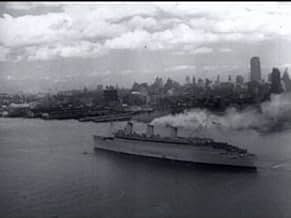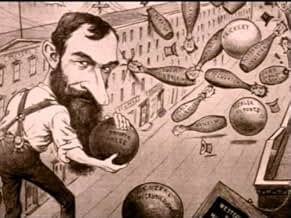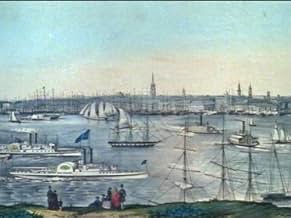New York: A Documentary Film
- TV Mini Series
- 1999–2003
Exploration of New York City's rich history as a complex and dynamic city that has played an unparalleled role in shaping the nation and reflecting its ideals.Exploration of New York City's rich history as a complex and dynamic city that has played an unparalleled role in shaping the nation and reflecting its ideals.Exploration of New York City's rich history as a complex and dynamic city that has played an unparalleled role in shaping the nation and reflecting its ideals.
- Won 1 Primetime Emmy
- 3 wins & 5 nominations total
Featured reviews
It's basically the kind of documentary in which once you see one part of it, say part 2 covering 1830 to the 1870, or part 5 covering the early 1900's, and you want to see more, you'll know what you're getting. One could criticize the over-abundance of dramatic, TV-esquire music, the emphasis on piling on the weight on certain subjects over others, or that (ironically) the time given still isn't enough. But as one interviewee says, there is not one definitive book or books by an author that give a totally clear idea of what New York was like in such a time and place or another. For someone who has been to the Apple countless times, seen many of Manhattan and Bronx's sites, and recognized that New York carries with it the residue of dozens of passing generations and cultures and tragedies and joys, this serves as THE documentary, at least with information terms, what New York was. At the least, you can impress (some of) your friends and family with bits of information, like about Alexander Hamilton or how the formation of all the NYC roads were built, or the bits within the massive scope of the immigration stories.
I was born and lived the first half of my life in the city, was always passionate about it, and yet the program had so much fascinating information I didn't know – not only about the distant past, but the complex back-room city politics (some disastrously wrong headed, even aggressively racist) that were going on in my early years.
It's always lively, often touching and asks important questions about what makes a city and why they're so important -- as well as "how can a city keep 'modernizing', but not lose it's soul?" It also forced me to abandon some supposed "facts" I'd been brought up with as a New Yorker, like the idea that names of immigrants were commonly changed at Ellis Island.
The last episode, made after the rest of the documentary, is devoted entirely to the Word Trade Center; it's inception, it's building (and the complex, sometimes dark politics behind it), it's successes and failures as architecture and urban planning, and of course it's horrifying demise. While it's the most emotional of the episodes, it does feel a bit apart from the others, spending it's entire length on one very focused subject. Not a problem, other than a bit of change in style.
If one had to nit-pick it would probably be the use of hyperbole in some of the narration. I lost count of how many crises were 'the worst the city ever faced'. But that is a tiny fly in a ton of ointment.
The images, still and moving, are beautifully chosen (great seeing moving images from the turn of the century New York), the various expert talking heads are passionate and articulate, and I learned so much more than I expected.
It's interesting that film-maker Ric Burns' brother Ken has received so much more attention. I find Ric's many documentaries often the equal of Ken Burns' work, and indeed sometimes find them more emotional.
A must see film for any person who has a passion for modern history.
It is a loving history of a great city, beautifully executed. Like a sibling or parent of a flawed man, the historians and other contributors see the flaws but love the subject despite them.
A serious history of New York, like of the U.S., reflects the contradictions that go back to the very early days of this city and this country: A melting pot where people of many classes, nationalities, languages and religions learned to live and get along in close proximity – and where many people hated everyone unlike them, or who resented or oppressed everyone whose group arrived in a wave after their own. Where a spirit of democracy, community, equality, public service and a hand up for everyone who needed it resided side-by-side with unbridled greed, indifference to the suffering of others not doing as well as oneself, stupendous corruption, exploitation of slaves and virtual (wage) slaves.
Some of the other reviews seem to miss the message by a mile – the historians and other contributors provide useful insights – and accurate ones. I don't know if every numeric and temporal statement is dead-on accurate, but the thrust and the many, many details and nuances discussed throughout the series are correct. From the first line uttered by the narrator in Episode 1: "On September 2, 1609, Henry Hudson "
The superlatives, too, are on the mark. Like it or not, New York has not only been a city of all kinds of "firsts" and "biggests" and "bests" but also has a more dynamic and interesting history than most others -- which is why these superlatives are so frequently present. If some day Burns chooses to make a documentary about St. Petersburg or London or Beijing, I'm sure there will be a lot of talk about those cities to the exclusion of all others. In other words, this is a documentary about New York, not a city in Australia, Egypt, France or Russia - where the 19th Century rural peasants DID live much as they had in the Middle Ages.
How anyone watching this series and paying attention, could miss the many, many more things Burns covers besides race, class and greed – is surprising. That the series discusses these frequently is not surprising – since long before Hudson sailed up the river later named for him – all 3 have been factors in the history of New York from 1609 to today. To ignore this fact would have been to whitewash the truth. Watch "Rambo" or "X-Men" if you want fiction. Burns and his contributors report these truths – and extol the many virtues – or strengths of New Yorkers famous and anonymous by way of explaining the evolution and rise to the top of the city.
Too slow? Really? It covers 400 years , an hour and a half per century for heaven's sake. Personally, I couldn't get enough.
Anyone who has any desire to gain some knowledge about New York should watch this. I picked up the CD today because the songs on it are amazing - very deep and very emotional. Anyone who enjoys history will probably enjoy this film. I got it as a Christmas present in 2001 and it's been one of the best presents I've ever received.
Did you know
- TriviaOriginally, the film was to be a seven-episode documentary. After the World Trade Center was destroyed in the terrorist attacks of 11 September 2001, an eighth episode - "The Center of the World" about the rise and fall of the Twin Towers - was made. It aired September 8, 2003.
- Quotes
Mario M. Cuomo: We had this fantastic contradiction of people who hated you so much, they were willing to give up their life to take yours - and people who loved humanity so much, that they were willing to run into the darn building, in the smoke and flame, just to save the life of somebody they never met.
- ConnectionsFeatures In the Street (1948)
- How many seasons does New York: A Documentary Film have?Powered by Alexa
Details
- Release date
- Country of origin
- Official site
- Language
- Also known as
- American Experience: New York - A Documentary Film
- Filming locations
- Production companies
- See more company credits at IMDbPro
- Color
































